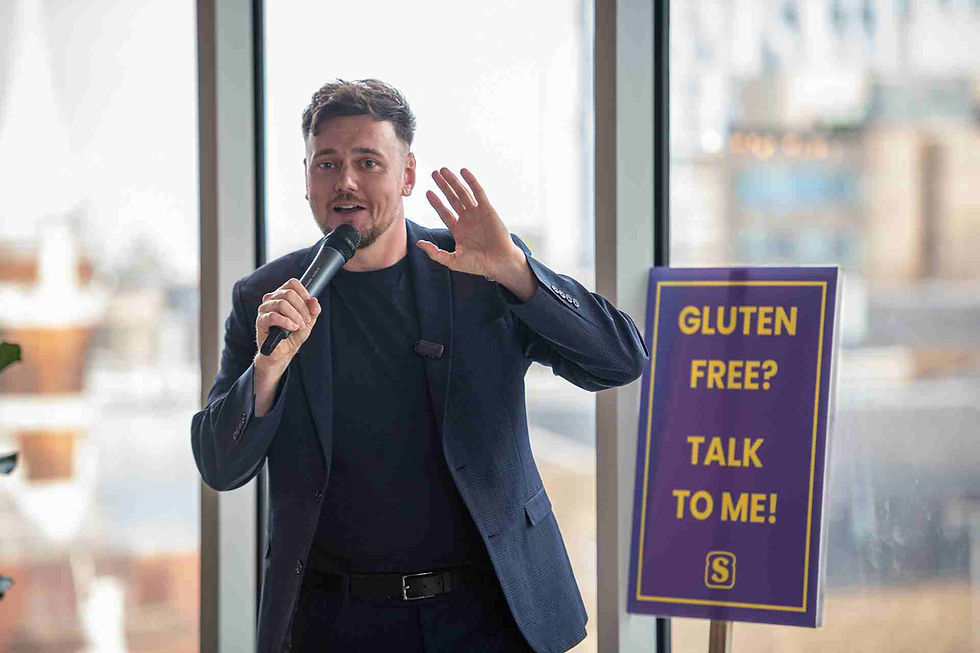What happens at an endoscopy
- Mar 4, 2024
- 3 min read
Updated: Nov 29, 2024
Have you been told you might have coeliac disease? Then you're probably about to have an endoscopy.
Once you've had blood tests done you'll be referred to a specialist who'll perform an endoscopy to determine whether you definitely have coeliac disease or not.

So what happens?
Firstly, you'll need to have been eating gluten for 6 weeks prior to your procedure.
If you're wondering what that looks like, my coeliac dietitian recommends around 2 slices of bread in at least 2 meals a day.
But you could swap the bread for something else that contains gluten, like a bowl of pasta.
The endoscopy procedure
The good news is the main bit's over really quickly. My endoscope was inside me for about two minutes (no, really).
Secondly, you won't need a general anaesthetic. If you've had one of these, it may be a relief not to have to go through another.
The main procedure takes 2 minutes
I'll explain what happens...
An endoscopy for coeliac disease involves having a camera that goes down your throat or nose so a gastroenterologist can look at your small intestine and take a sample for biopsy.
Whilst doing this, the endoscope may gently blow air so it's easier for the specialist to see what they're doing.
The analysis of the sample taken will determine whether you have coeliac disease.
That said, if there's visible damage to your villi in your intestine, the specialist may be fairly confident prior to the biopsy analysis that you have coeliac disease.
But some people don't have much visible damage. That's to do with the Marsh criteria (you can learn more about the Marsh critiera on my online course with a coeliac GP - this is free with membership).
Before any of this happens, you'll be given two options: a throat spray and/or sedation.
I opted for a throat spray (which numbs your throat and tastes - according to the specialist I had - like alcoholic bananas).
I've met many people who much preferred sedation. (And you can still have your alcoholic bananas if you wish.)
My reasoning at the time was that I didn't want to have the rest of my day affected by being sedated. You're not allowed to do much afterwards and will need to rest. If you have to drive, work or have small children to look after, you may decide it's better to go for the throat spray.
The endoscopy doesn't hurt, either, so you're not having to brace yourself for pain.
That said, I found it quite an emotional experience and the nurse afterwards offered me a biscuit (a normal, filled with gluten biscuit).
I mean, come on!
But let's not dwell on that. I know plenty of people who had much better experiences. Plus, mine was nearly 25 years ago and training has arguably improved since then.
Once you've had the procedure, you'll probably be told you can stop eating gluten. There are cases where this might be unadvisable (such as when a repeat endoscopy is needed) but if you're having severe symptoms from eating gluten, your specialist may advise you to stop putting yourself through any more trauma.
The results take a few weeks to come back (although this may differ depending on where you live).

After a diagnosis of coeliac disease is confirmed, you'll be referred to see a dietitian (if your doctor doesn't do this, make sure you ask). You should also have more tests done to check things like your vitamin D levels.
If the test comes back negative, it doesn't mean you don't have coeliac disease. It may mean they need to do a further test - e.g. if you haven't eaten gluten for long enough then you may get a false negative.
Whatever your diagnosis, please don't panic. There are many places you can turn to for advice. There are umpteen Facebook groups to join and The Gluten-Free Haven is a great place to start.








Comments